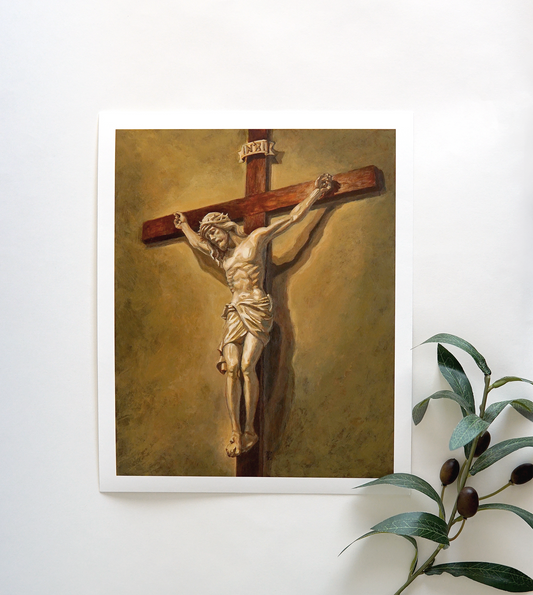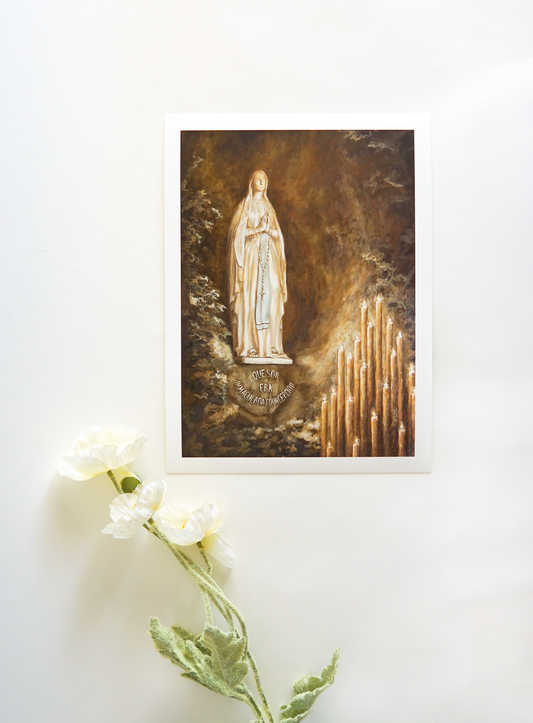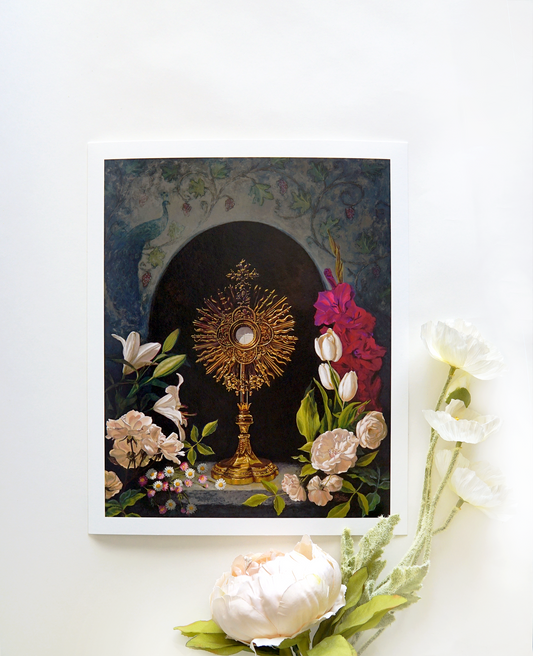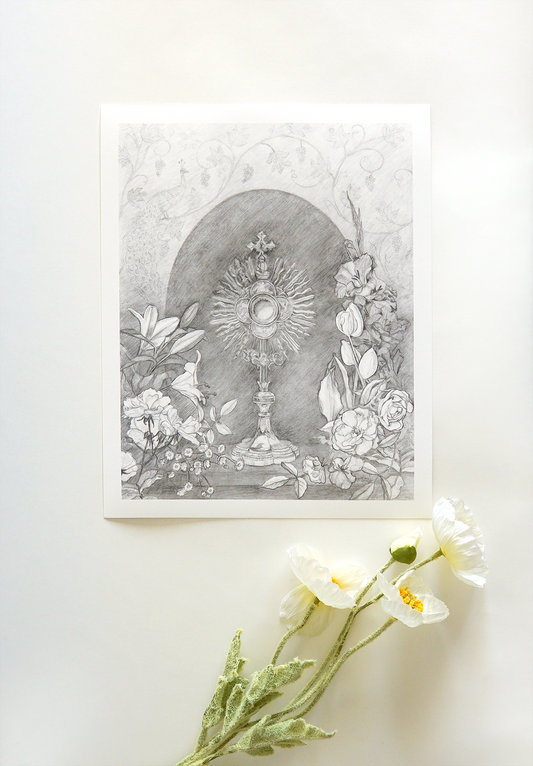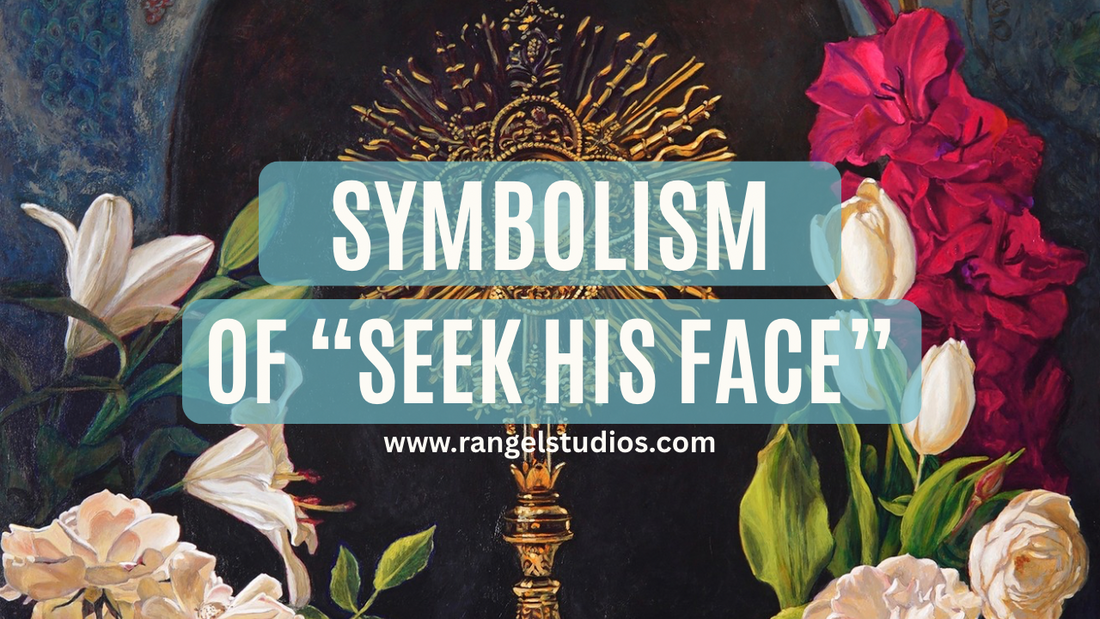
The symbolism behind the painting "Seek His Face" by Sacred Artist María Rangel Cardenas
By María Rangel Cardenas
My new painting “Seek His Face” (and the preliminary drawing) portrays a monstrance with the Holy Eucharist surrounded by flowers. This monstrance is the same one from our home parish in San Bernardino County. And some of the flowers in the painting were flowers from around the altar.
"Seek His Face" (preliminary drawing) by Maria Rangel Cardenas
The idea for this painting came about from a decision I made about a year ago to make sure to spend some extra time every week in adoration with my four children (and with my husband, too, when he could come)—praying in front of the Blessed Sacrament.
I found myself frequently meditating on the following psalm:
Psalm 27:8-9:
“Of you my heart has spoken: Seek his face./
It is your face, O Lord, that I seek;/
hide not your face from me.”
Eventually, in prayer, this painting took shape. It was my most recent work after a gap of about 10 years—I took time off to concentrate on being a wife and a mother to our 4 children. Now our oldest is 14 and the youngest is 5 years old, and I am starting to be able to find some time for myself and my art.
This project has filled my heart with joy and has given me so many ideas of future art.
In this work, I tried to capture a sense of stillness and peace. . . And also, an awareness of a gentle invitation to stop and consider the loving gaze of our Savior.
I spent many hours working on this painting, and so many times my work became like a prayer. I was praying for you.
✨✨✨
The Symbolism in “Seek His Face”
Lilies - St. Joseph
There is a legend that says that the Blessed Virgin Mary chose St. Joseph as her spouse when a lily blossomed from his staff. So, I have included lilies in my drawing to symbolize the love and purity of St. Joseph.
Roses - Our Lady
The White Roses symbolize Our Blessed Mother—the beautiful White Rose of heaven.
White Tulips - the Holy Spirit
The White Tulip symbolizes the Holy Spirit—the pure and infinite love of the 1st and 2nd Persons of the Blessed Trinity.
Gladiolus - the Ascension of Jesus
The Gladiolus Flower used to be carried into battle by Roman gladiators.
And in Christian art—with its leaves like swords and its blooms rising ever upward–the flowers symbolize the Ascension of Jesus into heaven.
Daisies - the little souls growing in God's garden
If I were a flower in God’s garden, I would be a simple, wild daisy…(like the ones in my painting)…blooming in a hidden place along the path to heaven. Similar to St. Thérèse, my confirmation saint, these daisies stand for all of us.
If you look at my painting, you can see a small daisy resting at the foot of the Monstrance. I picture myself as that daisy, reaching out to touch the hem of Jesus’ garment, praying for healing. (Read more about St. Thérèse and my art here.)
Peacock: Eternal Life
The peacock is a traditional symbol in Christian art. Surprisingly, It was once believed that the flesh of the peacock did not decompose. And so, referencing Christ’s victory over death, the peacock stood for “everlasting life” and even “royalty.”
Grapevines: the Precious Blood, the Wine of the Holy Mass
The peacock is resting on grapevines. These symbolize the Sacramental Wine—the Precious Blood of Jesus—in the Holy Sacrifice of the Mass
✨✨✨
Symbolism Summary
Lilies - St. Joseph
Roses - Our Lady
White Tulips - The Holy Spirit
Gladiolus - The Ascension of Jesus
Daisies - The little souls growing in God's garden (St. Therese, myself, all of us.)
Peacock - Eternal Life
Grape Vines - The Precious Blood, the Sacramental Wine of the Mass






